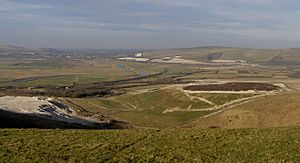Asham Quarry facts for kids
| Site of Special Scientific Interest | |
 |
|
| Area of Search | East Sussex |
|---|---|
| Interest | Geological |
| Area | 2.6 hectares (6.4 acres) |
| Notification | 1999 |
| Location map | Magic Map |
Asham Quarry is a special place in East Sussex, England. It's known as a Site of Special Scientific Interest (SSSI) because it holds important clues about Earth's past. This area is about 2.6 hectares, which is roughly the size of five football fields! It's located north of Newhaven and is part of the beautiful Sussex Downs Area of Outstanding Natural Beauty.
Contents
What Makes Asham Quarry Special?
Asham Quarry is a very important site for understanding Earth's history. Scientists study the rocks and soil here to learn about how our environment has changed over thousands of years. It's like a giant history book made of earth!
Clues from the Past
The site gives us important information about environmental conditions from the last 100,000 years. This includes a time called the Last Glacial Period, which was a very cold time when much of the Earth was covered in ice. It also tells us about the Holocene, which is the warmer period we live in now.
Reading Earth's History
Scientists use two main ways to "read" the history at Asham Quarry:
- Biostratigraphy: This involves studying ancient plant and animal remains found in the layers of earth. These remains can tell us what kind of life existed and what the climate was like.
- Lithostratigraphy: This is about studying the different layers of rocks and soil themselves. Each layer can show us what kind of environment was present when it formed, like a lake, a forest, or a sandy area.
Dating the Discoveries
One of the cool things about Asham Quarry is that scientists have been able to use radiocarbon dating on the materials found there. This method helps them figure out exactly how old the different layers and fossils are. It's like putting a precise date on each page of Earth's history book!
Why is it a SSSI?
Asham Quarry was officially named a Site of Special Scientific Interest in 1999. This means it's a protected area because of its unique geological features. It's also a Geological Conservation Review site, which highlights its importance for understanding the geology of the United Kingdom. Protecting these sites helps scientists continue to learn from them and keeps them safe for future generations.

